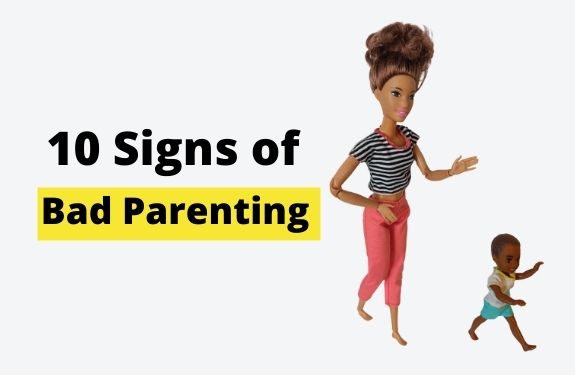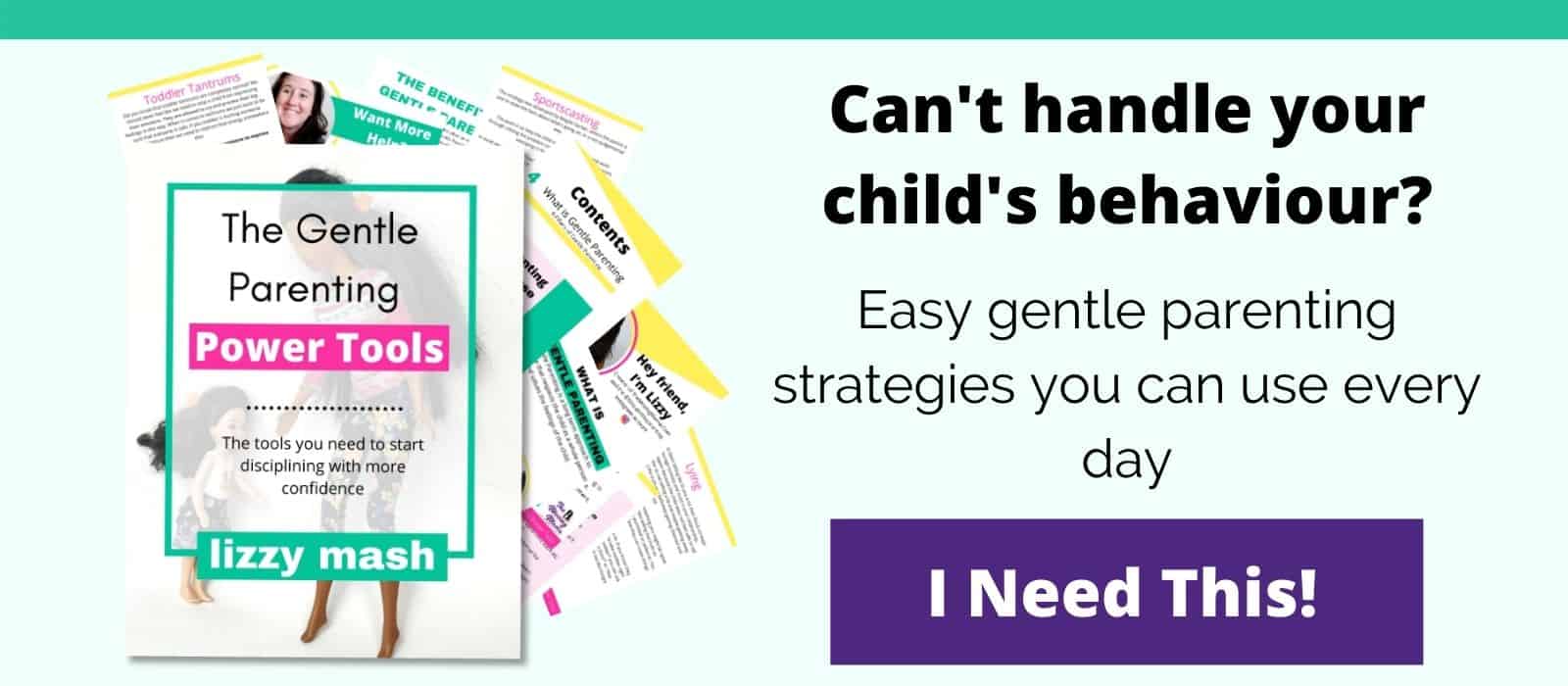The Signs of Bad Parenting And How to Fix It
Whether we like it or not, the truth is there is such a thing as bad parenting. Maybe you were raised with bad parenting, or you think you could be a bad parent. Here are 10 signs of bad parenting and how you can avoid them to help you become a better parent.
(This post might contain affiliate links, which means if you happen to buy a product I love then I may get a commission – at no extra cost to you! More information here.)

There is no such thing as a perfect parent
Before you start reading this list of 10 signs of bad parenting, it’s important to note that being a “perfect” parent is impossible, and there’s no one definition of what it means to be a “good” parent. I’ve written here about choosing the right parenting strategy for your family because the truth is that everyone is different and has their own unique needs.
It’s up to you to decide whether or not you think you are a bad parent, and there is a lot of mom-shaming online and in-person that can make you start to doubt yourself. Even if you can relate to many of the items on this checklist, it doesn’t mean you’re automatically labelled a “bad parent” but that you might have room to improve (as we all do).
Challenge yourself to learn more as a parent and improve your parenting skills.
10 Signs of Bad Parenting
1. Lack of Self-Awareness as a Parent
Raising children is not easy. It’s time-consuming, expensive, and stressful. The stakes are high, and the responsibilities are significant. And yet, parents continue to have children without considering what it entails. Lack of self-awareness as a parent can lead to an unhealthy life for both the parent and their children.
Self-awareness is the process of understanding one’s thoughts, feelings, actions, and motivations while recognizing their effect on oneself and others. Self-awareness includes understanding past experiences with a sense of objectivity and managing complex thoughts, so they don’t control our behaviour or emotions in the present moment.
This lack of self-awareness from parents is seen through their interactions with their kids or other people in general.
If you would like to become more self-aware as a parent, be sure to follow the advice found here from Psych Central.
2. Lack of Respect for Your Child
A significant part of Gentle Parenting is to respect children because it creates a foundation for more conscious parenting.
Respect cannot be demanded; it must be earned. You wouldn’t respect a boss just because they tell you to – you might be nice to their face but insult them behind their back. You would have respect for that boss, though based on the way they treated you.
Respecting your child helps them to respect you too.
Lack of respect for a child can look like a parent who always puts their needs before the child and dismisses the child’s feelings.
3. Bullying Your Child is Bad Parenting
Believe it or not, but many parents can end up bullying their children.
Making fun of their interests, laughing at them when they get hurt, calling them names, etc., are all ways that parents bully their children.
A parent might have grown up being treated this way by their own parents and thought it was normal, but the truth is this can be very destructive behaviour that needs to stop. Bullying can permanently damage the relationship between the parent and child and also teach the child not to trust their parent with their true, authentic self.
The child might start to put on a new personality to protect themselves from the parent’s bullying, and when that child is older, they might struggle to know who they are.
Related: 28 Worst Things Parents Can Say to Their Kids
4. Overpowering Your Child’s Opinions
Children want to contribute to the world around them and have some control. They might not always have beneficial opinions, but sometimes they can have good ideas.
When a parent always overpowers their child’s opinion, it doesn’t give the child the opportunity to grow as an individual and know what they think. Give your child a chance to express their opinion, even if it’s different from yours.
It’s important to know that your child is a unique person, separate from you, and they deserve to have their individuality.
5. Failing to Teach Essential Life Skills
If you never teach your child essential life skills (appropriate for them at their development), this can hurt them in the long run. Either a parent neglects the child or the parent is being overbearing and always doing it for the child, and in the end, the child does not learn how to do this skill on their own properly.
Children need to learn things like taking care of their bodies (getting dressed, brushing their own teeth, etc.) or how to cook, cross the street safely, etc.
These lessons help prepare a child for the real world when they are grown up, and failing to teach these skills to a child can lead to frustration and failure in adulthood.

6. Blaming and Shaming Your Child for Problems in the Household
Blaming and shaming children is a typical parenting style that has been around for ages. However, research shows that this parenting style can have negative consequences on children.
Shaming a child is about conveying disapproval or disappointment with a child’s behaviour. Shaming happens through words, actions, or facial expressions. When utilized as a parenting strategy, shaming causes the child to regret their actions to change their behaviour in the future. Unfortunately, when used excessively, it can produce long-term detrimental effects on the child’s psychological well-being and self-esteem.
Children develop shame as early as age 1 when they start developing self-consciousness as individuals separate from their parents.
Shame can last with a child long into their adulthood and affect many areas of their life. Some adults struggle to do things like spending money to buy new clothes when old ones don’t fit because their parents blamed them as a child when they needed new clothes.
7. Acting Manipulative and Using Fear as a Motivator
When fear is used on children, it is no secret that a child will often do what an adult wants, but this does not mean that fear (or manipulation) should be used to get a child to do what you want.
Fear, such as the threat of punishments, doesn’t teach a child how to correct their own behaviour. They will only do what you want because they are scared, which means they might find ways in the future to get away with it.
This makes it harder for you as a parent, but it can also mean that as an adult, your child struggles to do what’s right because they have no motivation to do so when there is no fear of punishment.
Related: Think Punishments Work? Think Again
8. Not Setting Clear Boundaries for Your Child’s Behavior
Children need consistency, and one area where they need it is in the boundaries you set for them.
If you tell your child they are not allowed to climb on the table, then it’s essential to hold that line you’ve drawn. Don’t allow them to do something after you’ve told them it’s not okay.
This might mean your child cries and screams, but you can validate their feelings while still sticking to your set boundary.
Finding the balance between not being overly strict and not being excessively permissive can be challenging, but it’s essential.
When a parent doesn’t set clear boundaries with a child, this can be a sign of bad parenting because what often happens is the child will do things the parent doesn’t like, and the parent will eventually freak out and scream at the child. It can also lead to the child getting hurt or the child not listening to rules when it’s imperative (like with safety issues).
Some children can become very reckless without a parent who teaches them essential boundaries.
Related: Setting Firm Limits and Boundaries with Kids
9. Poor Role Modeling in Front of Children
Children are fascinated by their parents. They do what they see their parents do. This can lead to them modelling their behaviour after the parent’s actions, which is not always bad. The role of a parent is to be an example and set good examples for the child to follow.
Parents need to be mindful of how they model behaviours in front of children because they are not instructing the child on appropriate or inappropriate behaviour.
Parents who drink alcohol in public, curse, or swear can teach children these behaviours without noticing it. For example, if a mother tells her child that adults talk like this when frustrated, she may unintentionally teach her son or daughter that swearing is an okay way to express anger.
Without noticing it, some parents will gossip about others, storm off when they’re upset, or quit whenever things get complicated, and then be surprised when their children do the same things.
This doesn’t mean you should be perfect in front of your children at all times because that can be extremely hard to achieve, but as a parent, it’s essential to think about what behaviour you are okay with your child seeing.
If you know you do things you don’t want your child to do, you should find ways not to behave in front of them.
10. Withholding love and affection from your child
Children have an innate need for love, care, and affection. If they don’t get these from their parents, they may use different ways to fulfill that need. For example, some children might start doing reckless things or develop depression or anxiety disorders.
In addition to showing no physical signs of affection towards their children, many parents also show no verbal signs of appreciation. This can be confusing for a child as this is what they often look for when trying to understand if someone loves them or not.”
How to Fix Bad Parenting Immediately
If you’re reading this, you probably don’t want to be a bad parent, and you probably want to change.
Here are the steps you will take
- Become aware that you are a bad parent
- Forgive yourself for being a bad parent
- Seek personal healing (through therapy, facing past trauma, journaling etc.)
- Expand your knowledge on how to parent well
- A commitment to do better (including a commitment and apology to your child)
Learn new parenting skills
Here are some new parenting strategies you can try to replace any bad parenting strategies you know you have been using.
5 Respectful Tips When Kids Don’t Listen
Toddler Tantrums (The Full Effective Guide)
The BEST way to handle a 3-4 year old who lies
Conclusion of 10 Signs of Bad Parenting
Even if you relate to these 10 signs of bad parenting, it does not automatically mean that you are a bad parent. Parents, moms especially, tend to be too hard on themselves.
Mistakes happen with parenting, and no one gets it perfectly every single day.
The important thing, though, is to acknowledge the areas you could improve without dwelling on the past.
You can read my post here on how to be a better mom for some ideas.
Every parent can improve, but it’s vital that they actually see the mistakes they’ve made and genuinely desire to improve.
10 Signs of Bad Parenting You Might Have

